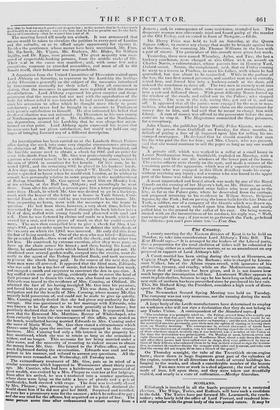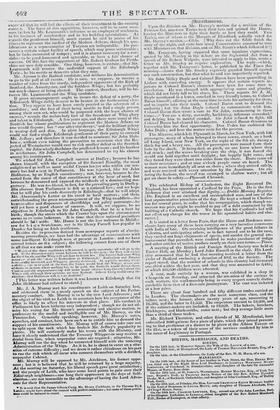SCOTLAND.
Edinburgh is involved in all the bustle preparatory to a contested election. The Whigs, Tories, and Radicals, will have each a candidate in the field. The Tories have put forward Mr. Learmonth, the coach- maker ; who lately held the office of Lord Provost, and rendered him- self unpopular with the great body of the ten-pound voters. It may be
cape( el that he will feel the effects of their resentment in the ensuing come: t. The force of this opposition, however, will be in some men. sure Lraken by Mr. Learmonth's influence as an employer of workmen, in his business of coaehmaker and in his building speculations. As regards the gentleman himself, much cannot be said in praise of his fitness to represent the intellect of the Modern Athens, though his qua- lifications as a representative of Toryism are indisputable. Ile pos- sesses a certain vulgar facility of speech, which may prove serviceable ; but he lucks command of temper ; and it is almost necessary for a can- didate to be good-humoured and agreeable, to have a fair chance of success. Of this fact the supporters of Mr. Robert Graham fur Perth- shire are now duly sensible. One thing, however, is curtain—that Mr. Learmonth will receive the undivided support of the Edinburgh Toriea be his merits or demerits what they may.
Mr. Aytoun is the Radical candidate, and declares his determination to go to the poll at all events. He is sure, we. suppose, to receive a number of votes from the sturdy, independent opponents of the Kirk of Scotland, the Annuity-tax, and the faithless Whigs ; but has probably not much chalice of being elected. The contest, therefore, will lie be- tween Mr. Learmonth and the Whig candidate.
If gross mismanagement ought to insure the defeat of a party, the Edinburgh Whigs richly deserve to be beaten in the forthcoming elec- tion. They appear to have been sorely puzzled in the selection of a candidate ; and the fact of their being unable to find a single person among their own set, who could be proposed with the least chance of success,+ reveals the melancholy fact of the decadence of Whig glory and talent in Edinburgh. A few years ago, and there were many at the Scottish bar whose qualifications to represent the Modern Athens no one would dispute ; but " star after star decays," and the brilliant galaxy is waning doll and dim. In plain language, the Edinburgh Whigs could not find a single Edinburgh gentleman of their party to succeed Mr. Jeffrey ;. and therefore it was decided to nominate Sir John flub- house, without even taking the precaution to ascertain that the Re- jected of Westminster would care to risk another defeat in the Scottish capital. Sir John wisely disclaims the proffered honour ; and his brother in misfortune, Sir John Campbell, has determined to try his chance among his countrymen. We wished Sir John Campbell success at Dudley ; because he has shown himself, with the exception of Sir Samuel itomilly, the most enlightened as %veil as most useful Crown lawyer who within our me- mory has had a seat in Parliament. He was rejected, like Sir John Hobhouse, by an English constituency; not, however, because be de- serted from the cause of that constituency at the hour of need, but because he denounced and exposed the misdeeds of a domineering ma- gistracy. He was 100 liberal, in fact, for the prevailing party in Dudley. His absence from Parliament is .felt as a national loss ; mid we hope that he will play his cards discreetly in Edinburgh—that he will adopt Mr. Abercromby's Letter as his creed in local matters ; and then, notwithstanding the gross mismanagement of the Whig twaddlers—the bunters after and dispensers of sheriffships and paltry patronage—he will yet have a good chance of success. It will, we suppose, be no objection in Edinburgh to Sir John Campbell, that he is a Scot by birth ; though the stress which the Courier lays upon the circumstance seems to us quite ludicrous. It is time that these national prejudices should be tai l aside. Mr. Hume is not the less welcome in Middle- sex for la i ig a Scotchman, nor is Sir Henry Parnell less popular in
Dundee for being an Irish gentleman. • Besides the impression derived from newspaper reports of electio- neering proceedings, we have had the advantage of conversations with some intelligent Et inburgh men at present in London : and we have several letters on the subject ; the following extract from one of them is all that we can make room for.
Wadi of the three candidates will succeed, is quite uncertain : all la ill go to the Pon. I r the Dissenters rally round Aytoun, he will he the man : the Tory will stickle for the (lintel!, and the Whig vw ill not dare to desert her. The Conrirr had some Whig nonsense at out the • state of Radicalism in Edinburgh.' Radicalism and Toryism haver catly increased, awl Whiggery greatly de,reased. At a public meeting wl.ere a shilli..A I as to be paid at the door, the Tories would heat the Whigs; at one, out- er-doors, or in-door, where nothing has to be paid, the It adieals would devour them. Castilla and old acquaintanceship will make many citizens bang (loosely) about the Whigs still, although their opinions are now Radical. Gibson Craig would carry the election : that Hobhouse will, is very doubtful."
[This letter was written before it was known in Edinburgh that Sir John Hobhouse had refused to stand.] Mr. A. Murray met his constituents at Leith on Saturday last, and addressed them in a manly speech on the subject of his Parlia- mentary conduct. Mr. Murray is to be the new Lord Advocate ; and the object of his visit to Leith is to ascertain how his acceptance of the office is likely to affect his interests in that plate. His conduct in Parliament has been hitherto very independent ; though we do not ad- mire his voting for Mr. Strutt's unmeaning and abortive motion, in preference to the useful and intelligible one of Mr. Harvey, on the Pension-list. Generally speaking, however, Mr. Murray's votes, speeches, and conduct, have been such as to entitle him to demand the support of his constituents. Mr. Murray will of course take cure not to split upon the rock which has broken Mr. Jeffrey's popularity to pieces. He will cautiously make his terms with the Ministry, and have it clearly understood that the Treasury Whipper-in may receive a denial from him, when unpopular votes are required : otherwise, Mr. Murray will rue the day when he connected himself with the tottering Administration of the Whigs. As it is, be is about to enter on a situ- ation of extreme difficulty ; and we deem it rather chivalrous on his part to run the risk which all incur who connect themselves with a divided, unpopular Cabinet.
Mr. Murray will be opposed by Mr. Aitchison, his former oppo- nent; but it is believed that he will be returned by a large majority. At the meeting on Saturday, his liberal speech gave great satisfaction ; and the people of Leith, who have some local points to gain over their Edinburgh neighbours—too long their oppressors in the days of Self- election—tire not insensible to the advantage of having the Lord Advo- cate for their Representative.
• It is said that Sir James Gibson Craig, Mr. Henry Cockburn, or Sir Thomas Dick Lander, might have stood the contest with perfect confidence; but none of these gentle- Sten could be induced to stand.
a.





















 Previous page
Previous page